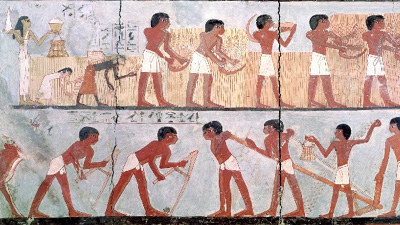Cities, Societies, and Empires
Teacher Resources
Driving Question: How did complex societies develop and how did they impact humans inside and outside these communities?
Once people started growing their own food, everything changed. Small groups evolved into massive, complex societies with thousands—even millions—of people. Explore how some of these communities grew into powerful states and empires, and how those changes shaped life—for both for the people within them and the wider world.
Learning Objectives:
- Investigate the development of agrarian societies.
- Understand the causes and effects of the development of cities and states.
- Use close reading to analyze how and why complex human societies formed.
Vocab Terms:
- dynasty
- elite
- empire
- government
- infrastructure
- specialist
- state
Opener: Cities, Societies, and Empires
To teach this lesson step, refer to page 2 of the Lesson 3.1 Teaching Guide.
The Comparison One-Pager explains how this important skill is addressed in OER Project courses.
Ancient cities may not look like the ones we know today, but understanding the defining characteristics of cities, societies, and empires is key to making sense of the past.
Looking Ahead
To teach this lesson step, refer to page 3 of the Lesson 3.1 Teaching Guide.
Get an idea of how other teachers use Unit Notebooks by checking out this conversation in the OER Project Teacher Community.
Agree or disagree? Evaluate some statements before you dive into Unit 3—then see how accurate you were when you get to the end of the unit.
Cities, Societies, and Empires
To teach this lesson step, refer to page 3 of the Lesson 3.1 Teaching Guide.
Check out our Reading Guide to learn about the Three-Step Reading approach.
people built governments and religions to navigate their new, more-complex world. Explore this transformation in the video, then dig deeper with the article.
-
Guiding Questions
-
Before you watch
Preview the questions below, and then review the transcript.
While you watch
Look for answers to these questions:
- Why does this video begin with a letter from Iddin-Sin?
- How did agriculture change human societies in this period?
- How did urbanization help create long-distance trade routes?
- What are states, and why were they important to early agrarian societies?
After you watch
Respond to these questions: Do you think we should take Iddin-Sin’s four-thousand-year-old letter seriously as historical evidence? Why or why not?
-
Guiding Questions
-
Before you read
Preview the questions below, and then skim the article. Be sure to look at the section headings and any images.
While you read
Look for answers to these questions:
- Why is so much history focused on societies that had states and cities?
- What drove innovation and adaptation in early agrarian societies?
- Why did cities usually develop in agricultural communities.
- Why was the development of wealthy elites important to the rise of states?
After you read
Respond to these questions: Do you think states or cities could have developed without the rise of agriculture? Why or why not?
Framing Unit 3
To teach this lesson step, refer to page 5 of the Lesson 3.1 Teaching Guide.
Looking to deepen your understanding of frames? Take a look at this conversation in the OER Project Teacher Community.
The frames can help us to see how communities grew into states, and how states became empires. Explore the growth of complex societies in the video, and then apply what you’ve learned in the activity.
-
Guiding Questions
-
Before you watch
Preview the questions below, and then review the transcript.
While you watch
Look for answers to these questions:
- How do village-based societies differ from earlier forms of community?
- Why did cities need even more governance?
- What is a state?
- What do these changes look like when viewed through the lens of the networks frame?
After you watch
Respond to these questions: Did everyone experience the changes brought about by the growth of complex societies in the same way? Why or why not?
Closer: Cities, Societies, and Empires
To teach this lesson step, refer to page 6 of the Lesson 3.1 Teaching Guide.
Use what you’ve learned about complex societies in this lesson to evaluate the pros and cons of living in different types of communities.
Essay Review
To teach this lesson step, refer to page 6 of the Lesson 3.1 Teaching Guide.
Using either your own DBQ essay from Unit 2 or a sample essay, evaluate how well the writing shows claim and focus.






